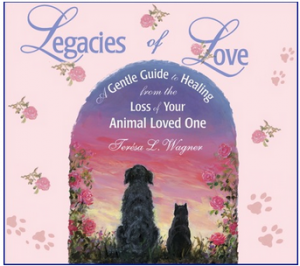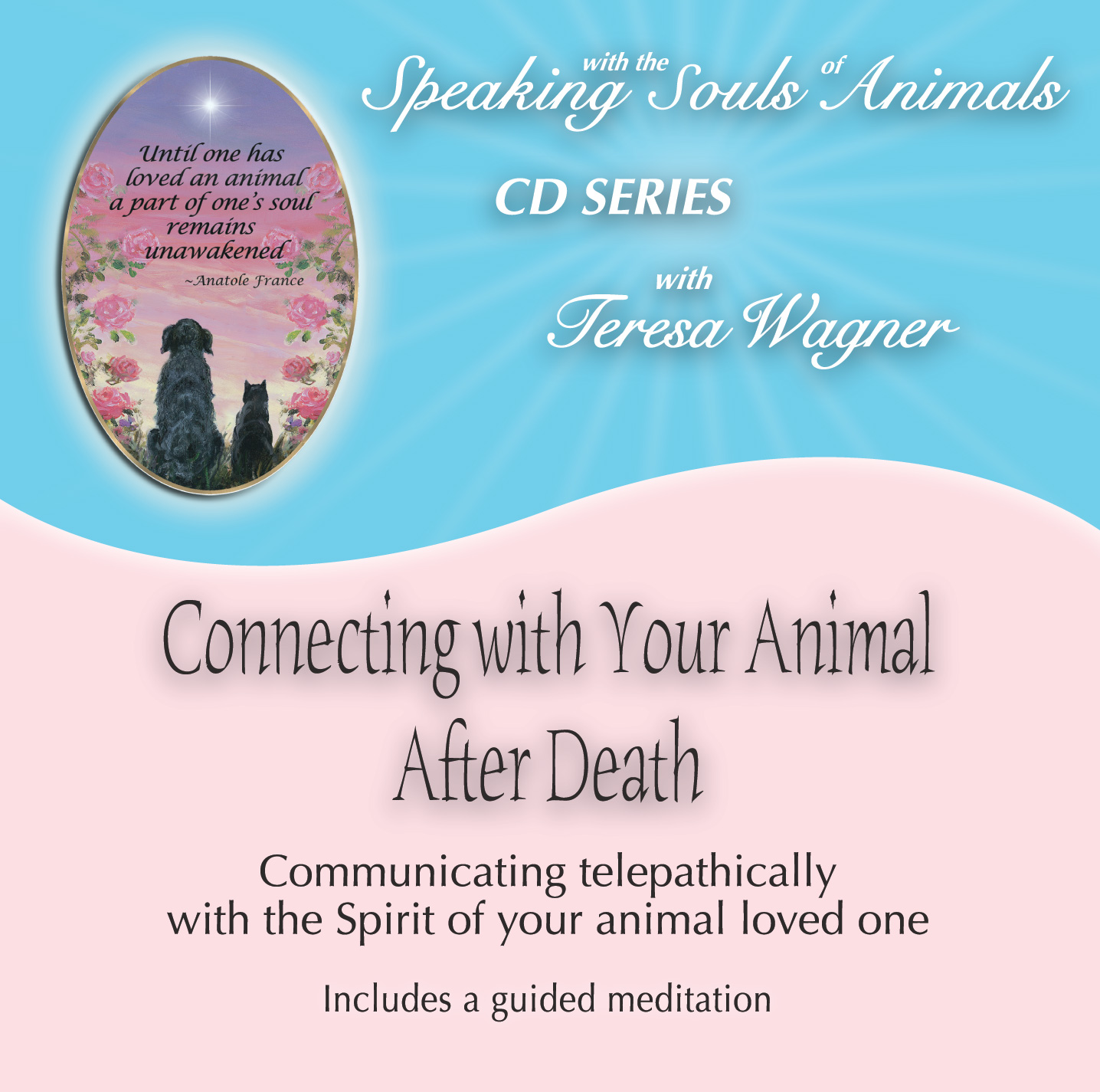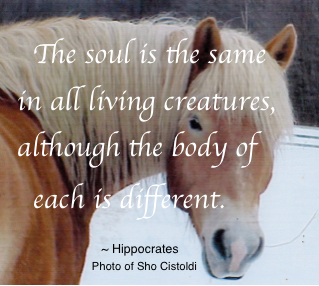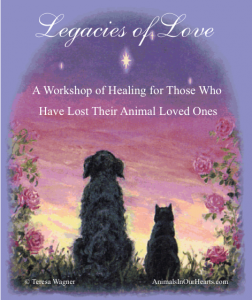
In addition to the inevitable anguish that most of us experience when losing a animal loved one, the next most common emotional challenge I hear about with clients is guilt. Those of us who love our animals deeply want to do best by them throughout their lives. At the poignant times when we are faced with preparing to say goodbye, and after they have left, many of us are filled with thoughts that may trigger guilt, such as:

These questions, born of love and a desire to clarify whether we gave the absolute best we possibly could to our beloved animals, are both understandable questions and constructive questions. During the crisis of knowing that our relationship with a loved one is about to change (or has already changed) irrevocably via physical death, it is natural that we reflect upon our relationship and the extent to which we believe that we are doing or did all we could and in the best possible ways.
Sometimes, we are too hard on ourselves and our sense of guilt is not justified. Other times, after we clarify all the issues involved we may determine that, yes, we believe our guilt is in fact founded. Exploring which it is, and processing it thoroughly, is critical to our finding peace rather than staying stuck and burdened with guilt the rest of our lives. Unexplored and unresolved guilt complicates and prevents the full healing of our grief. When we take the courage to explore our culpability (the degree of intention and control we had about what happened), acknowledge what circumstances influenced what we did or didn’t do, and examine the expectations that are driving our guilt to determine whether they are realistic, reasonable and founded or not, we bring ourselves closer to relieving the anxiety of guilt and feeling peace.
When we come to believe that our sense of guilt is founded, in order to find peace with it and to release the energetic burden of it, we need to clarify all we’ve learned from the situation, commit to doing things differently next time, deeply apologize to the one we believe we have let down or wronged, and finally, to be open and willing (however long that may take) to forgive ourselves.
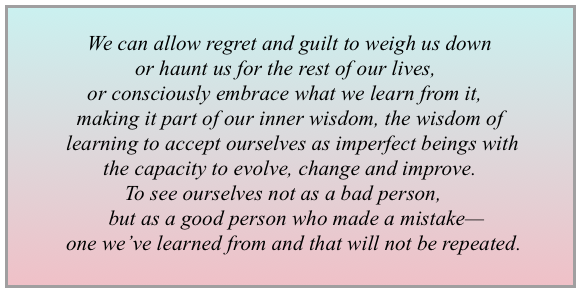
I was working with a client recently who described feeling guilty—questioning herself about whether she had grounds to feel guilty. She raised the following questions with the request that we discuss them first between the two of us, and then discuss them with her dog Pumpkin on the other side to get his opinion.
Question 1:
Did I take Pumpkin for too many treatments when he was sick?
Was it too much? Too stressful?
Question 2:
Did I arrange for all these treatments because I was not willing to let go?
One of the first things I encouraged her to talk about was the story of Pumpkin’s illness, including how she made the decisions for his treatments, i.e., what led her to choose each one, what professional advice was involved for each specific treatments, their frequency, etc.; how comfortable and confident did she feel about the treatments; and, how Pumpkin seemed to respond to the treatments both physically and emotionally? I asked her to ponder these questions to help her clarify both the facts and her feelings that were the basis of her treatment decisions.
I already knew from previous discussions with this client that her decisions were very likely based on very thorough and diverse research about what was best for her animal’s situation and on her great love and desire to do whatever may be possible for reduction of symptoms and alleviation of discomfort and pain. However, for her to begin to resolve her guilt, it was important for her to see this. Any outsider’s opinion (including mine) that “she did the best she could” may bring a temporary sense of relief but it was her opinion about her choices that held the power to help her come to terms with her guilt.
As our discussion unfolded, during which she courageously looked back and deeply examined these issues, she began to clarify that, yes, she would make the same decisions again and could feel good about the ones she made because each treatment, its frequency and duration seemed like the best possible course of action at the time, and that Pumpkin did not seem visibly distressed from the treatments. She said that exploring all of this resulted in her feeling a bit better about the decisions she made and acted on for Pumpkin’s care.
At this point in our session it was time for us to seek her beloved animal’s opinion about all of this. She said that even though he had not seemed distressed by the treatments, she was concerned that he may have felt pain or discomfort that didn’t show, and/or that he pretended he was not distressed so he would no upset her. When we talked with him about the treatments, Pumpkin said that he did not really like the car travel to the vet and the acupuncture appointments, but it was worth those tedious car rides because the treatments made him feel better. He also said that there were not too many treatments, and that most importantly to him, he knew that all of it was being orchestrated by his person because she loves him so much and wanted him to feel as well as possible and not be in pain. He was emphatic in wanting her to know all of this. My client then wanted to know if any of the treatments ever made him feel worse or were too stressful to endure, even though he said he felt better afterwards. He said that sometimes they made him very tired, and that he grew to really hate the needles (injection needles, not the acupuncture needles) but being tired and getting shots was really was worth it because he knew that all these treatments meant he got to stay in his body longer with his person which is what he wanted. (I did some clarifying with Pumpkin to be sure he was not minimizing any of this just to make his person feel good. He was not).
Some clients I’ve worked with who describe feeling guilty just want to know what their animal is thinking and feeling, and when the animal describes, for instance, being happy with the decisions made, the client is then ready to stop any further discussion and any exploration of their guilt. Learning what our animals think and feel about our decisions and actions on their behalf can be extraordinarily valuable, and I highly recommend communicating with them during the challenging times of serious illness, and sometimes after death, to get their perspective.
However, when it comes to our sense of guilt, it is equally valuable and just as important for us to explore and consider our own expectations of ourselves and the extent to which we feel we have met them or not. When someone we feel we have wronged tells us that they forgive us, or that there is nothing to forgive, it can bring an enormous sense of relief. If we stop with that relief, however, and don’t explore our own thoughts about what we did and why, we don’t learn all there is to learn from the situation. And, we give our power away by presuming that the only way out of guilt is for the other to forgive us. Forgiveness from another is mighty powerful in helping us feel relief from guilt. Being forgiven by someone we love who we feel we have let down or harmed in some way can bring a sense of grace that is inestimable. It is clearly of substantial value to the process of healing guilt, and it’s understandably tempting to stop there because it feels so good. But by itself, forgiveness by another does not heal guilt. Only we can do that. If we stop our process after absolution from another, we stop our own learning and prevent full healing.
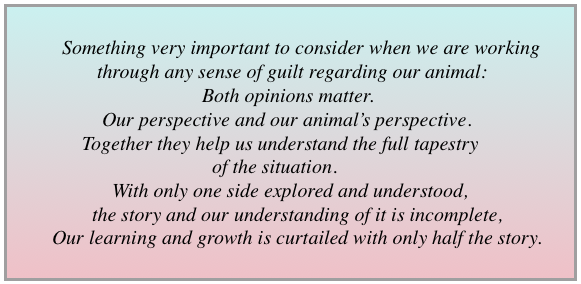
At this point in the session with my client we moved on to her second question, which was a powerful and important one:
Did I arrange for all these treatments because I was not willing to let go?
I suggested to my client that she close her eyes, then gently and supportively guided her to take a few deep and gentle breaths, then to quietly, and without any judgement of herself whatsoever, ponder the following questions:
Was I truly unwilling to let Pumpkin go? (i.e., was I resisting it so much that I was pushing treatments on him only or mostly because I couldn’t bare him leaving, because I just couldn’t let go?)
OR. . .
Was I feeling not ready to let him go, not wanting to let him go? (i.e., was I very uncomfortable, full of anticipatory grief at the thought of letting him go, feeling like perhaps I may never be “ready”or“want” him to die, but still accepting that it was coming?)
She thought about this and said it was very helpful to consider the difference between being unwilling and not wanting him to go. She said that she realized in retrospect that she hadn’t been really unwilling to let him go, it was just hard to know the time was coming to let him go and that of course she did not want him to go.
With her eyes still closed I asked he to reflect on a final important question:
Looking back at all we’ve discussed, I am wondering if at this point you believe that the decisions you made for Pumpkin’s treatments, including their frequency, were driven primarily on what was best for him, or, were they driven primarily by a desire to prolong the time until you would have before having to say goodbye, to postpone the emotional pain you would feel when you would had to say goodbye?
If both were factors in your decisions, what weight did each factor hold?
Pretty quickly, she said that she realized now that she had NOT made her treatment decisions, including frequency, based on her discomfort and her own anticipatory grief in letting go, but rather fully for medical reasons (that she continued to research and consult with veterinarians throughout the process) to abate uncomfortable symptoms and to keep him as pain free as possible.
She further said how helpful it was to look at these two issues separately as well as how one might influence the other. Before doing that, she said, she was just all jumbled up with guilt, but that now she realized that for this particular situation there really was no reason to feel guilty. Yes, she was overwhelmed with anticipatory grief and dreaded the inevitable good bye, but she was now clear that her own emotional pain did NOT drive her treatment decisions.
She still felt a great deal of grief, but it was no longer made worse from a burden of guilt. Her grief was now what I think of as “clean grief”—unencumbered and uncomplicated by the anxiety of believing we did something wrong and not quite knowing how to make it right. Having released the energetic burden of guilt she was now more free to move through her grief and heal.
If you look at the illustration at the beginning of this article and compare it with the one below, notice the difference. In the first illustration, the person could not even stand up straight from the stress and strain of the burden of guilt he was carrying. He wasn’t present with his broken heart because it took all his energy to put one foot in front of the other to deal with the heaviness of guilt. In this second illustration, the person’s heart is definitely still broken, but he now has energy available to be fully present with, tend to and heal his heart. This is possible because his broken heart is no longer overshadowed by guilt.
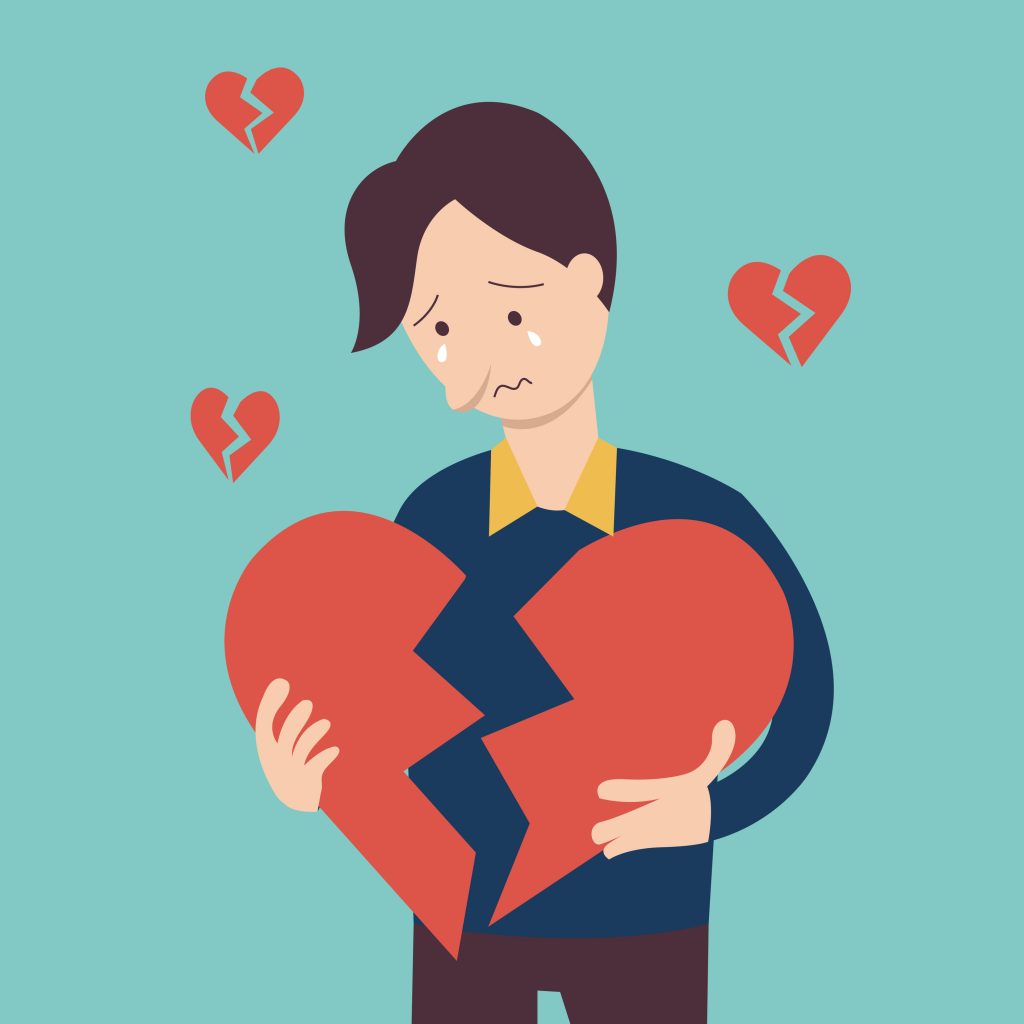
Image used with license from Dreamstime.com
We talked more about the difference between an unwillingness to let our animals go which could cause our animals physical and emotional suffering, and the naturalness of our never wanting them to go or perhaps feeling ready for them to go. When we feel unwilling to let them go, we create a resistance to what is, and resistance to what is that cannot be changed always causes inner conflict and more pain.
On the other hand, it’s perfectly natural and to OK to not want to let go. None of us want our loved ones to be sick and die. And many of us never feel ready for them to die, even when we have fully accepted that it is coming and even when we’ve told our animals that they have our blessing to leave when it is right for them. But despite not feeling ready, we can live with the paradox of not wanting to let go and yet being willing to do so, so our animal does not suffer. This paradox is part and parcel of caring for a beloved animal with a serious/terminal illness. While our beloved animals are dealing with the changes and challenges in their physical bodies as they prepare to let go and transition into the spiritual realm, we, as their loving and protective parents/guardians, are tasked with not only choosing and providing the best treatment and palliative care for them, but to simultaneously be present with and manage our own journey of emotional turmoil and grief.
With a better understanding of the process, support from others and a great deal of compassion for ourselves along with all that love we have for our animals, we can move through these subtle layers of letting go and find peace—for ourselves and for our relationship with our beloved animals.

As lengthy as this article is, it can’t begin to cover all the guilt related issues and specific situations we may experience regarding our animals, and the tools available to help us come to peace with guilt when we feel our guilt is founded. If you are struggling with guilt, consider investing in your well-being and healing (or as a gift for someone you love) with one or more of the following resources for additional help and support:
Healing Guilt: Finding Peace and Self-Forgiveness
An on demand class including two sessions of 5 hours of audio recordings and 83 pages of handouts.
This class has been approved for 6 hours of continuing education RACE credits by the American Association of Veterinary State Boards
Grief Counseling and/or Animal Communication Private Consultations (can be combined in same session)
Free gift of the on demand teleclass Legacies of Love, A Healing Pet Loss Workshop for Those Who Have Lost Their Animal Loved One when you purchase a multi-session package of private counseling and/or animal communication consultations.
Series of On Demand Classes to Help You Heal From Pet Loss
Helping Others: The Animal Loss and Grief Support Institute
Grief Counseling Certification Program
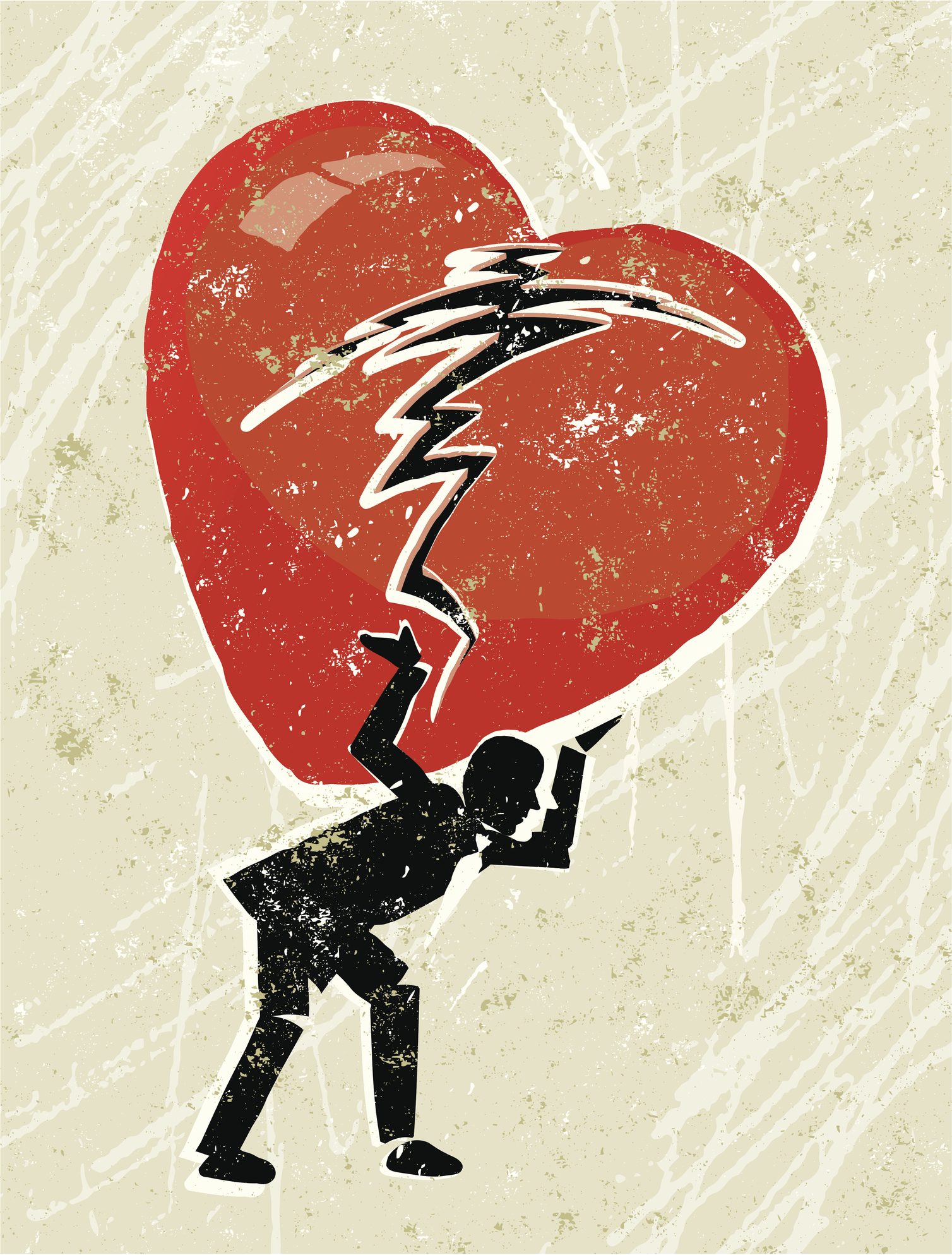
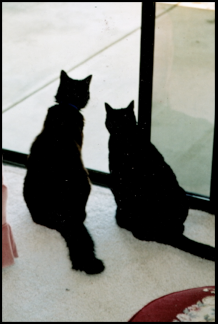

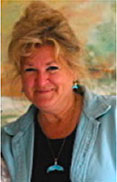 Thank you for visiting my blog. It is a place for me to share stories from and about animals, love, loss and healing. The articles are primarily written by me, but some are from my colleagues who have graciously allowed me to share their words here.
Thank you for visiting my blog. It is a place for me to share stories from and about animals, love, loss and healing. The articles are primarily written by me, but some are from my colleagues who have graciously allowed me to share their words here. 